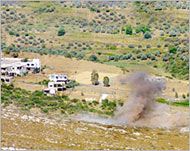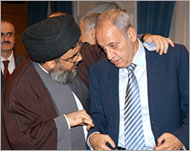Lebanon talks focus on Shebaa Farms
Leaders of Lebanon’s rival factions resumed on Monday talks seeking consensus on the biggest issues dividing the country – the status of Shebaa Farms, the fate of the pro-Syrian president and the UN call for Hizb Allah’s disarmament.

Aljazeera reported that the national dialogue conference resumed in Beirut after a six-day interruption caused mainly by disagreement over the status of Shebaa Farms – an Israeli-occupied border area that the Hizb Allah says is Lebanese but that the UN says is Syrian unless Beirut and Damascus amend their border.
Monday’s discussions focused on the main points of contention, particularly whether Shebaa Farms belong to Lebanon or Syria.
Druze MP Walid Jumblatt and Hizb Allah chief Hassan Nasr Allah brought to the meeting documents and maps to support their respective viewpoints on the Shebaa case, Aljazeera said.
The participants reached an initial agreement to work towards establishing full diplomatic ties with Syria and to disarm Palestinian fighters outside the country’s 12 refugee camps, political sources told Reuters.
Edging closer
They said the leaders, meeting to prevent a political crisis, also edged closer to agreeing on how to address the issue of Shebaa Farms.
“The issue of Lebanon’s relations with Syria is already behind our backs now,” one political source told Reuters on condition of anonymity.
 |
|
Jumblatt maintains Shebaa |
Another senior politician said a text was being drafted on the issue for the leaders to sign and announce on Tuesday.
Politicians and business leaders have warned of instability and economic woes if the talks fail.
“We must use all our potential to prevent the dialogue from collapsing,” parliamentary Speaker Nabih Berri, the convener of the conference, was quoted as saying in Monday’s edition of As-Safir newspaper.
“The conference provides a precious opportunity for national salvation,” Berri said of the talks.
Fuad Siniora, the prime minister, told As-Safir that any delay in a settlement would further damage the economy, which is reeling under a public debt of more than $35 billion racked up since the end of the 1975-90 civil war.
“The economy has been greatly harmed … every delay (in agreement) will increase the cost on Lebanon and the Lebanese,” Siniora said.
Talks positive
Participants in the four-hour morning session described the talks as positive, but it appeared a breakthrough was not close.
“The atmosphere is good. But discussions on some points are difficult,” Christian leader Samir Geagea said. He did not elaborate.
 |
|
The Shia parties are represented |
The talks resumed for three hours in the afternoon in what Berri called “a positive atmosphere”. He said he would announce the outcome on Tuesday.
Soldiers, armed police and concrete barriers cordoned off the parliament building on Monday as the 14 faction leaders – Muslim and Christian, pro- and anti-Syrian – arrived for the talks.
Druze leader Walid Jumblatt came in an inconspicuous car – a small, old Renault – for the sake of security. His bodyguards followed in another old car.
The conference began on 2 March, but adjourned five days later amid sharp differences on issues such as Emile Lahoud, the president, and Hizb Allah’s weapons.
In announcing the adjournment, Berri said the participants needed time to consult.